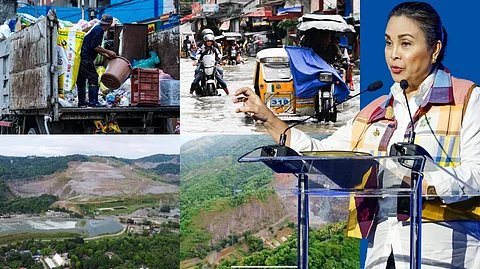
- NEWS
- the EDIT
- COMMENTARY
- BUSINESS
- LIFE
- SHOW
- ACTION
- GLOBAL GOALS
- SNAPS
- DYARYO TIRADA
- MORE

Senator Loren Legarda on Tuesday gave the government a failing mark for its response to the worsening climate crisis, urging swift and decisive action before the situation spirals further out of control.
Pressed by Senator Miguel Zubiri during an interpellation, Legarda declined to give a numerical rating, simply stating that the government has failed.
“I may not be able to give the percentage or the grade, but I would be honest in saying that we have failed. Government has failed the people,” she said.
In a privilege speech delivered in Filipino, Legarda painted a grim picture of the country’s vulnerability, calling it a deadly intersection of natural disasters and systemic neglect.
“Negligence, not the storm, is what kills,” Legarda declared, framing climate change as more than just an environmental concern, but a full-blown human rights crisis.
Citing the recent Advisory Opinion of the International Court of Justice (ICJ), she underscored that climate inaction is now potentially a violation of international law.
The ruling affirmed that states have binding obligations to mitigate and adapt to climate change under international human rights and environmental law.
“In line with this, I filed this morning a proposed Senate resolution affirming the binding nature of international climate obligations and urging its national implementation in light of the ICJ opinion,” she said.
Legarda pointed out the tragic irony of the Philippines—which contributes less than 0.5 percent of global greenhouse gas emissions—ranked as the most disaster-prone nation globally for four consecutive years according to the World Risk Report.
A long-time environmental advocate, Legarda recounted her decades of legislative work, from the landmark Climate Change Act to the Ecological Solid Waste Management Act and the Renewable Energy Act.
But she lamented that many of these laws, though pioneering, suffer from poor implementation and chronic underfunding — made worse by corruption and weak governance.
“The ink of the law on paper is not enough if its implementation is flawed,” she said. “What good is a plan if no one follows it? Even more so, no amount of funding will ever be enough if it’s being drained by corruption.”
Climate justice as climate prosperity
Legarda introduced a forward-looking framework rooted in the concept of “climate prosperity.”
Rather than framing climate resilience as merely survival, she argued it should empower communities to rise, thrive, and live with dignity.
She revealed that the Department of Finance is currently drafting a Climate Prosperity Investment Memorandum in partnership with the Climate Vulnerable Forum, a coalition of 74 climate-vulnerable nations.
The Philippine Climate Prosperity Plan aims to link climate adaptation with real investment in green infrastructure, energy, and jobs.
Four-point action agenda
Legarda urged her Senate colleagues to act decisively in four critical areas to mobilize and monitor climate finance by strengthening legislation that ensures transparent access to and the tracking of climate funds; to strengthen local adaptation by fast-tracking the updating and implementation of Local Climate Change Action Plans across all local government units, grounded in scientific data and real risk assessments; and to drive low-carbon development by accelerating the transformation of the energy, transport, agriculture, and industry sectors, supported by strong incentives for green jobs and sustainable technologies.
She also urged a demand for international accountability by leveraging the ICJ ruling to pursue justice, financing, and reparations from high-emission countries and fossil fuel corporations.
Further, Legarda issued a stark reminder that the climate crisis is not a distant threat but a present catastrophe already taking lives and futures.
“So the question is no longer what must be done or whether we are capable of doing it. We will be judged solely by our actions—or our failure to act,” she said.
